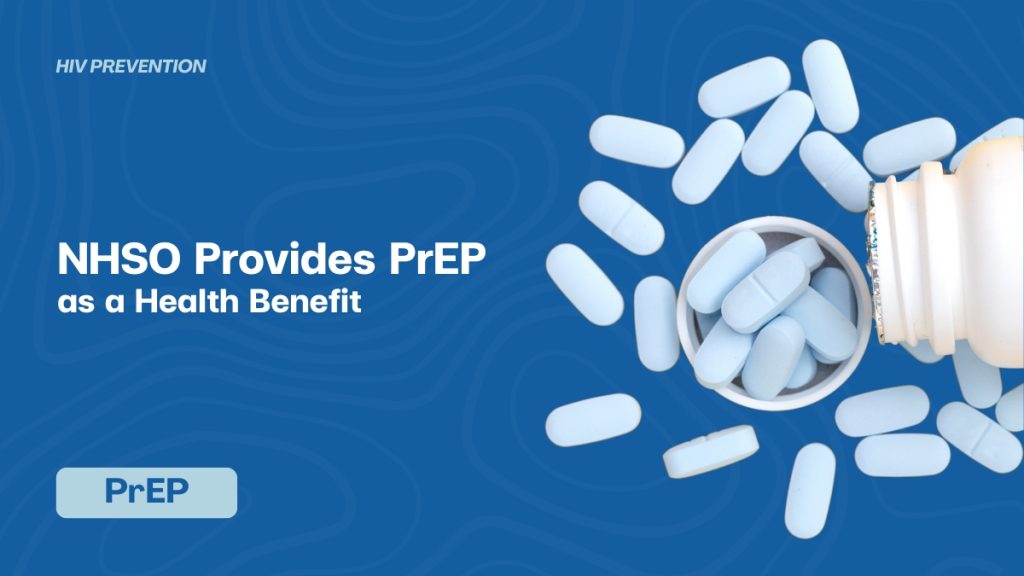In the present era, where the spread of HIV remains one of the major challenges for public health systems worldwide, preventing and reducing the number of new infections is a critically important goal. For Thailand, efforts to enhance healthcare services and lower the rate of HIV transmission have taken a significant step forward. The National Health Security Office (NHSO) has expanded its health benefits to include PrEP (Pre-Exposure Prophylaxis), a medication that helps prevent HIV infection. This benefit allows at-risk groups to access PrEP free of charge, marking a significant advancement in providing comprehensive healthcare for the Thai population.
What is PrEP? Why Did NHSO Add This Benefit?
PrEP is?
PrEP (Pre-Exposure Prophylaxis) is an antiretroviral medication used to prevent HIV infection before exposure to the virus. It is specifically designed for individuals who are not yet infected with HIV but are at high risk of contracting the virus. PrEP works by preventing HIV from entering and multiplying within the body’s cells, significantly reducing the risk of infection. Research and studies have shown that when taken correctly and consistently, PrEP can reduce the risk of HIV transmission through sexual activity by up to 99% and by over 70% for those who share needles. This makes PrEP a vital tool in the fight against HIV.
Why Did NHSO Include PrEP as a Healthcare Benefit?
The inclusion of PrEP by the National Health Security Office (NHSO) reflects a proactive response to the ongoing HIV epidemic in Thailand. While the number of new infections has decreased over the years, high-risk groups continue to face significant challenges. Recognizing this, the NHSO has prioritized improving access to PrEP as a means to strengthen HIV prevention and control efforts. The main reasons for this initiative include:

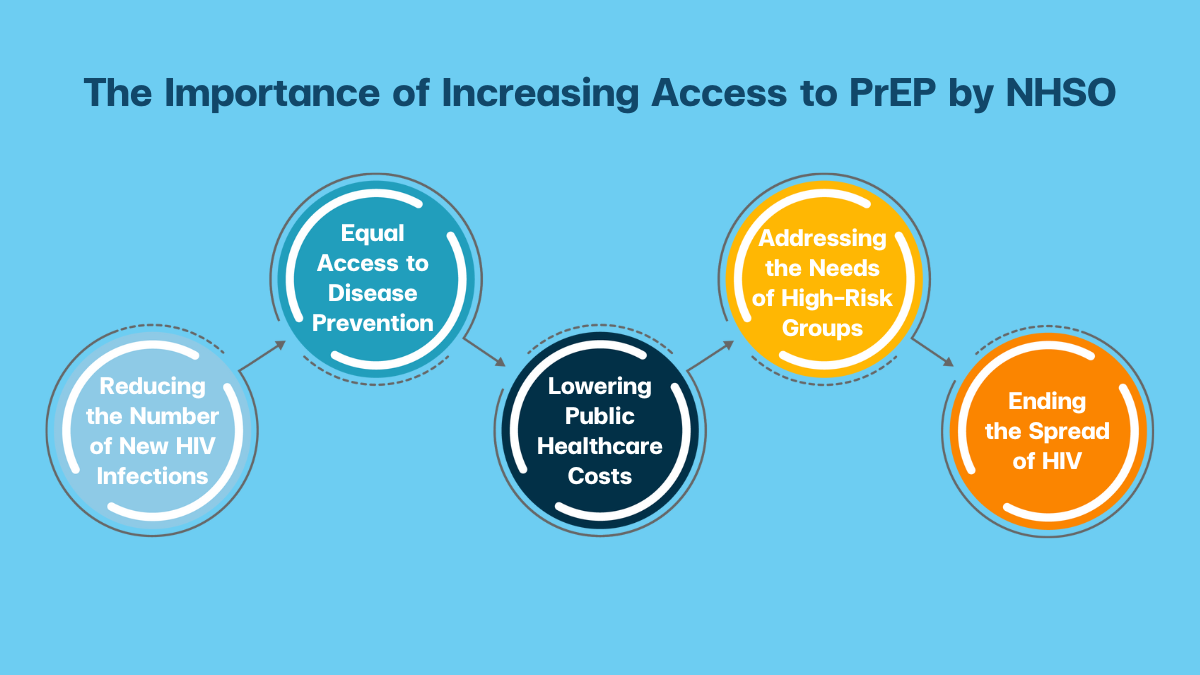
Reducing the Number of New HIV Infections
PrEP is a highly effective preventative measure. Expanding access to this medication ensures that high-risk populations can obtain it more easily and comprehensively, leading to a tangible reduction in new HIV infections.
Promoting Health Equity
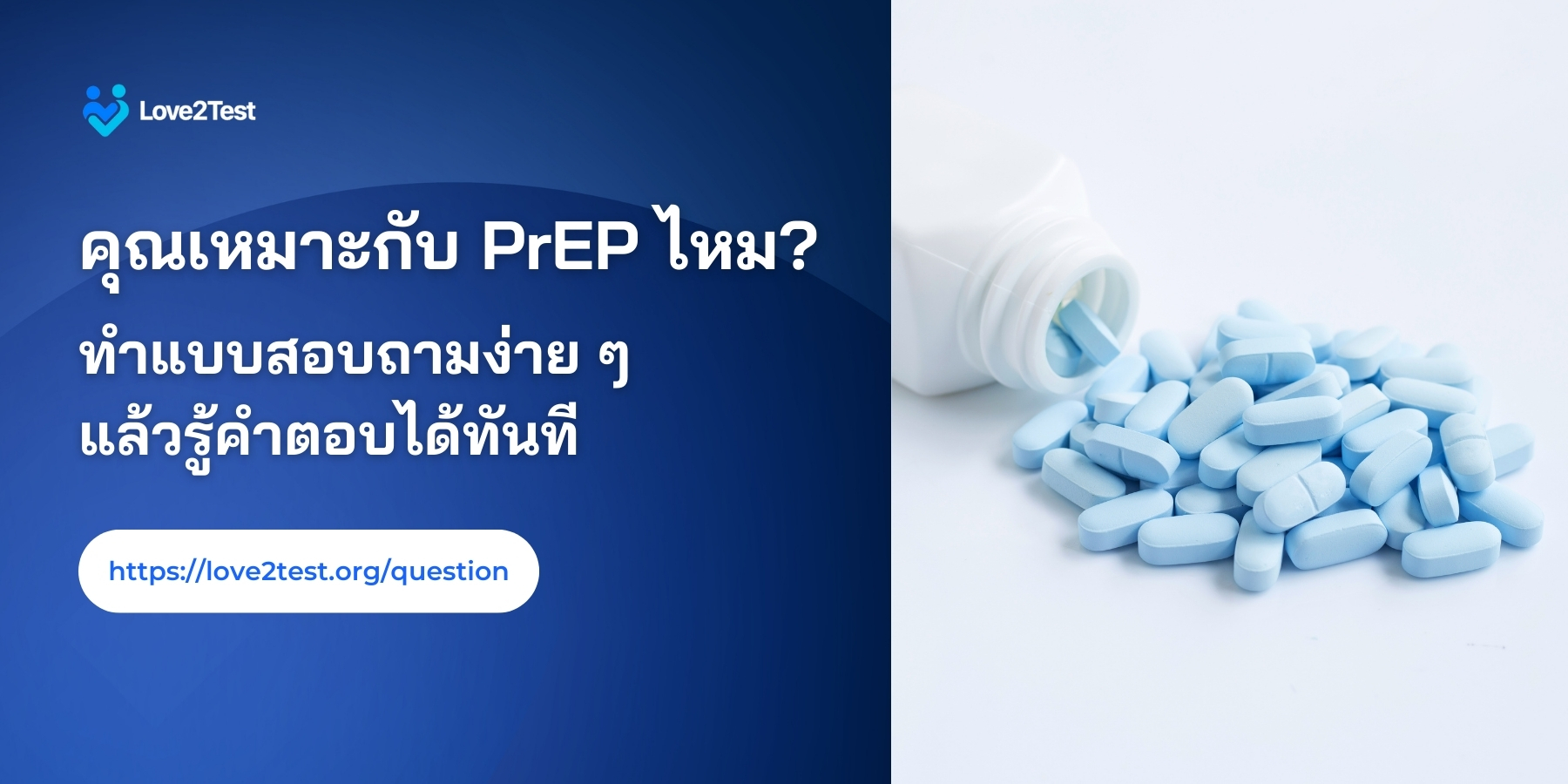
Every individual deserves equal access to disease prevention. By including PrEP in health benefits, individuals with financial constraints can now access it free of charge, eliminating concerns about cost and ensuring equitable healthcare.
Reducing Public Healthcare Costs
Prevention costs significantly less than long-term treatment. Promoting the use of PrEP is a cost-effective investment in public health economics, as it reduces future healthcare expenses associated with treating HIV infections.
Addressing High-Risk Populations
Certain groups, such as men who have sex with men (MSM), people who inject drugs, transgender individuals, and sex workers, are at higher risk of HIV infection. Expanding PrEP access enables these groups to protect themselves more effectively.
Supporting the Goal of Ending HIV Transmission
Thailand aims to end HIV transmission by 2030, in alignment with the United Nations’ goals. Including PrEP in healthcare benefits is a crucial step toward achieving this target and underscores Thailand’s commitment to global health initiatives.
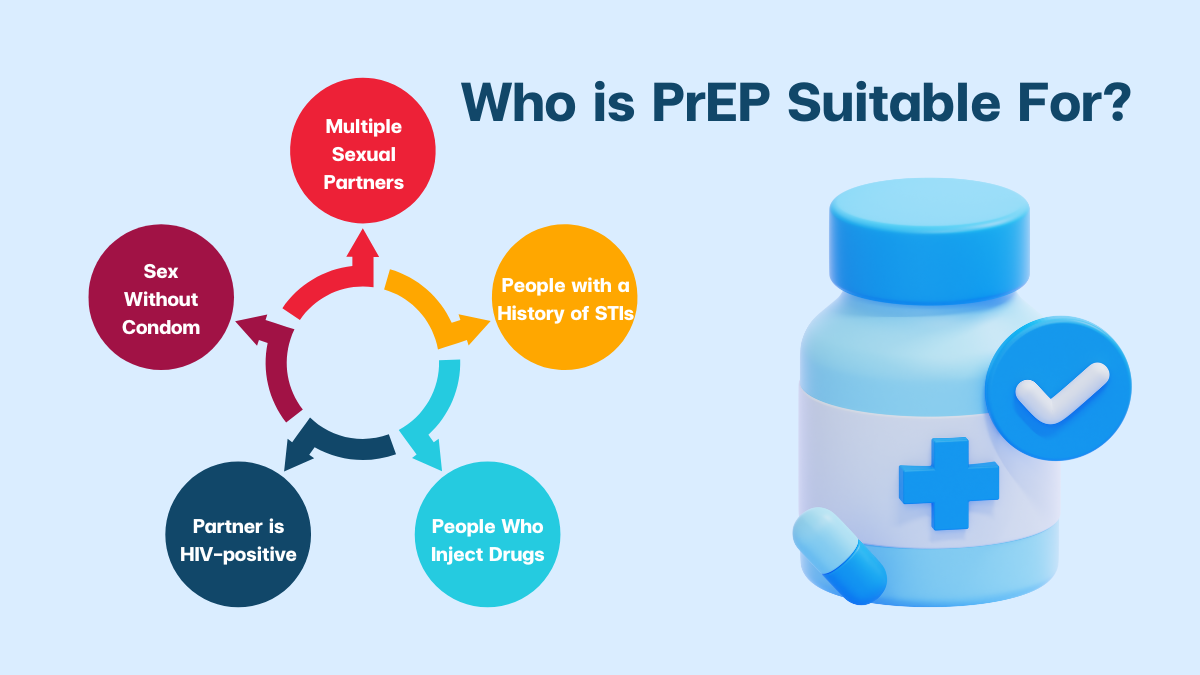
Target Groups Eligible for Free PrEP Services from NHSO
The National Health Security Office (NHSO) provides free PrEP services, focusing on high-risk individuals who are particularly vulnerable to HIV infection. These target groups include:
Individuals at High Risk
This group includes individuals at direct risk of HIV exposure, such as:
Serodiscordant Couples
Those in relationships where one partner is HIV-positive and the other is not. Even with consistent condom use, there remains a risk of transmission, which PrEP can help mitigate.
Individuals with Multiple Sexual Partners
Those who have multiple or frequently changing sexual partners, especially when condoms are not used consistently, are at higher risk of contracting HIV.
Individuals with a History of STIs
Those who have previously been diagnosed with STIs such as syphilis, gonorrhea, herpes, or other infections, indicating risky sexual behaviors.
People Who Inject Drugs (PWID)
Individuals who use injectable drugs and share needles are at significant risk for HIV transmission.
High-Risk LGBTQ+ Groups
The LGBTQ+ community is considered a high-risk group, especially:
- Men Who Have Sex with Men (MSM): This group faces a significantly higher risk of HIV infection if protective measures are not used.
- Transgender Women: Those engaging in risky sexual behaviors are at heightened vulnerability.
- Sex Workers: Both LGBTQ+ individuals and general service providers involved in sex work are particularly at risk.
PrEP offers an effective prevention option tailored for individuals in these high-risk categories.
Individuals Seeking Long-Term HIV Prevention
This group includes those planning continuous protection against HIV, such as:
- Serodiscordant Couples (Mixed-Status Couples): For couples where one partner is HIV-positive, PrEP provides additional protection for the uninfected partner.
- Residents in High HIV-Prevalence Areas: Those living in regions with high infection rates or engaging in long-term risky behaviors.
- Family Planners with HIV-Positive Partners: For individuals planning to start a family while preventing HIV transmission during sexual activity.
Why Focus on These Target Groups?
These groups are among the most at risk of HIV exposure. Without adequate protection, they face a higher likelihood of infection. PrEP, when used correctly and consistently alongside other preventative measures such as condoms, can reduce the risk of HIV transmission by over 90%. By extending this healthcare benefit, the NHSO ensures at-risk populations can access necessary medication while promoting proactive prevention. This approach not only helps individuals protect themselves but also effectively reduces the number of new HIV infections in the long term.
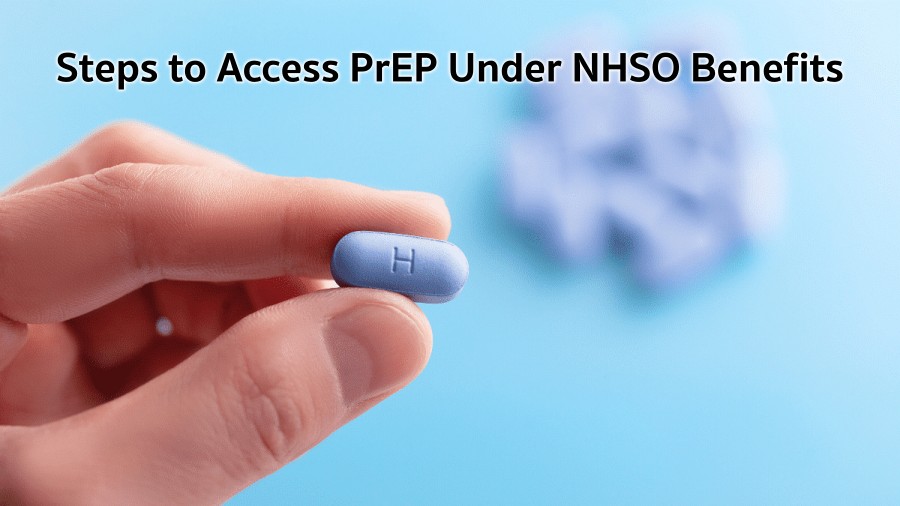
Steps to Access PrEP Under NHSO Benefits
1. Contact Participating Healthcare Providers
Access PrEP through healthcare providers participating in the program, such as:
- Government Hospitals
- Specialized Clinics
- Non-Profit Organizations (e.g., booking through the Love2Test website)
- Other Participating Health Units
You can verify the list of participating providers via the NHSO hotline at 1330 or on the NHSO website.
2. Risk Assessment
Healthcare staff or a physician will assess your eligibility for PrEP based on your risk profile, which includes:
- Risky Behaviors: Such as unprotected sex or frequent partner changes.
- Partner’s Status: If your partner is HIV-positive.
- History of STIs: Such as syphilis, gonorrhea, or other sexually transmitted infections.
3. Initial Health Screening
Before starting PrEP, you will undergo the following health checks:
- HIV Testing: To confirm that you are HIV-negative (those who are HIV-positive will require antiretroviral treatment instead).
- Kidney Function Test: As PrEP may impact kidney health over time.
- Additional Testing: Such as screenings for other STIs, if necessary.
4. Starting PrEP
If you pass the risk assessment and health screening, you will be prescribed PrEP along with usage instructions. The physician or healthcare staff will guide you on:
- Daily PrEP Usage: Taking the medication regularly for maximum effectiveness.
- Complementary Preventative Measures: Such as consistent condom use.
You may also need to attend regular follow-ups to monitor your health, assess the medication’s impact, and ensure continued HIV prevention.
Benefits of Using PrEP
| Reduces the Risk of HIV Infection | Through Sexual Activity: PrEP is highly effective in preventing HIV infection when taken consistently and correctly, reducing the risk by over 90%. |
| Through Needle Sharing: Among people who inject drugs, PrEP can reduce the risk of HIV transmission from shared needles by up to 70%. | |
| Enhances Confidence in Daily Life | Individuals in high-risk groups, such as those with HIV-positive partners or those engaging in risky behaviors, can lead their lives with greater confidence, free from constant worry about HIV infection. |
| Encourages a sense of safety and long-term self-care. | |
| Strengthens Relationships | Particularly suitable for serodiscordant couples (where one partner is HIV-positive), PrEP supports emotional and relational stability by minimizing the risk of transmission. |
| Supports National HIV Reduction Goals | PrEP serves as a key public health policy tool, significantly decreasing the number of new HIV infections at the population level. |
| Widespread access to PrEP helps reduce risks within communities and high-risk groups, such as the LGBTQ+ community, people who inject drugs, and sex workers. | |
| Promotes Long-Term HIV Prevention Goals | PrEP aligns with the UNAIDS vision of ending new HIV infections globally. By integrating PrEP into public health strategies, nations can work towards a future where HIV transmission is virtually eliminated. |
Precautions for Using PrEP
While PrEP is highly effective in preventing HIV infection, its use should always be under medical supervision. Users must strictly adhere to medical advice, including:
- Taking the medication on time and consistently.
- Attending health check-ups as scheduled by the doctor.
- Using condoms alongside PrEP to protect against other sexually transmitted infections (STIs).
Following these precautions ensures both the effectiveness of PrEP and comprehensive protection against other health risks.
The Future of HIV Prevention in Thailand
According to medical studies, PrEP has been proven to be highly effective in reducing HIV infections, especially when used consistently and correctly. Research also indicates that individuals using PrEP tend to be more health-conscious and more likely to undergo regular health check-ups, which benefits the overall public healthcare system. In addition to providing PrEP as a healthcare benefit, Thailand remains committed to developing policies and related services to raise awareness in society and expand healthcare access to all population groups. This includes promoting routine HIV testing, advancing the development of HIV vaccines, and supporting ongoing medical research. HIV prevention is not solely the responsibility of government agencies. Everyone can contribute, whether by raising awareness within their social circles and families, encouraging loved ones to undergo health screenings, or adopting appropriate preventative measures, such as using condoms, avoiding risky behaviors, and supporting those who wish to use PrEP.

Related Articles
The inclusion of PrEP as a healthcare benefit by the National Health Security Office (NHSO) marks a significant step forward in improving public health, particularly for high-risk groups. If you or someone close to you falls into a high-risk category, don’t hesitate to consult a doctor or a nearby healthcare provider to learn more and begin using PrEP. This proactive step ensures a safer and more confident future. If you have questions about this healthcare benefit, you can contact the NHSO hotline at 1330 or visit the NHSO website for more information.
Reference:
แจงสิทธิประโยชน์ “เอชไอวี/เอดส์” คุ้มครองตั้งแต่ตรวจ-ป้องกัน รับยาต้าน ไม่เสียค่าใช้จ่าย
- nhso.go.th/news/4221
แกะกล่อง สิทธิประโยชน์ ด้าน HIV STIs HBV&HCV แบบจุก ๆ
- ddc.moph.go.th/das/news.php?news=39766&deptcode=das
ตรวจ-ป้องกันเอชไอวี ครอบคลุมทุกสิทธิรักษา ถ้ากินยาต่อเนื่อง แพร่เชื้อไม่ได้
- nhso.go.th/news/4217
